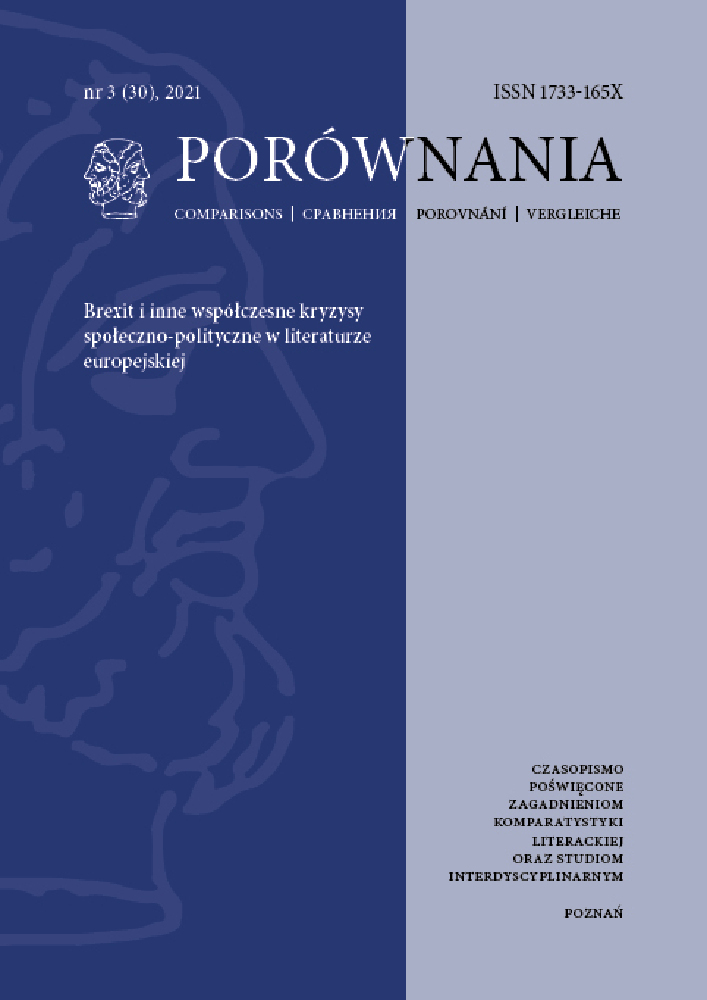Abstract
The paper aims to show how the traditions of science fiction and, above all, invasion literature provide the ideological background for reading Andrew Hunter Murray’s The Last Day as a novel about Brexit. As it draws on anxious visions of the future, in which the enemy lurks around every corner, and the only salvation is complete isolation from the world, Murray’s work is read here as a Brexit dream come true, in which Britain is once again great, independent and uncontaminated by foreign elements. By evoking the myths that focus only on glory and conveniently “forget” the dark sides of the empire, the novel demonstrates that the fantasies of the past are as distant as the fantasies of the future; the loss of the world that never was is reworked in The Last Day into the loss of ecologically viable planet.
References
Andrews, Kehinde. The New Age of Empire: How Racism and Colonialism Still Rule the World. Penguin UK, 2021. E-book.
Barry, Aoife. “Britain Has Pride about Not Succumbing to Fascism in the 20th Century—I’m Suggesting It Could Happen in the 21st.” The Journal.Ie. 7 May 2020. https://jrnl.ie/5031116. Accessed 28 April 2021.
Bulfin, Ailise. “The Natural Catastrophe in Late Victorian Popular Fiction: ‘How Will the World End?’.” Critical Survey 27.2 (2015a): 81–101. https://doi.org/10.3167/cs.2015.270207
Bulfin, Ailise. “‘To Arms!’: Invasion Narratives and Late-Victorian Literature.” Literature Compass 12.9 (2015b): 482–496. https://doi.org/10.1111/lic3.12253
Keep, C.J. “Fearful Domestication: Future-War Stories and the Organization of Consent, 1871–1914.” An Interdisciplinary Critical Journal 23.3 (1990): 1–16.
Matin, A. Michael. “The Creativity of War Planners: Armed Forces Professionals and the Pre–1914 British Invasion-Scare Genre.” ELH 78.4 (2011): 801–831.
Matin, A. “Gauging the Propagandist’s Talents: William Le Queux’s Dubious Place in Literary History. Part One.” Critical Survey 32. 1/2 (2020): 79–98. https://doi.org/10.3167/cs.2019.112604
Mondal, Anshuman A. “Scratching the Post-Imperial Itch.” Brexit and Literature: Critical and Cultural Responses. Ed. Robert Eaglestone. London and New York: Routledge, 2018. 82–91.
Mukherjee, Ankhi. “Migrant Britain.” Brexit and Literature: Critical and Cultural Responses. Ed. Robert Eaglestone. London and New York: Routledge, 2018. 73–81.
Murray, Andrew Hunter. The Last Day. London: Hutchinson, 2020.
O’Toole, Fintan. Heroic Failure: Brexit and the Politics of Pain. Head of Zeus, 2018. E-book.
Rau, Petra. “Autumn after the Referendum.” Brexit and Literature: Critical and Cultural Responses. Ed. Robert Eaglestone. London and New York: Routledge, 2018. 31–43.
Sanghera, Sathnam. Empireland: How Imperialism Has Shaped Modern Britain. Penguin UK, 2021. E-book.
Shaw, Kristian. “BrexLit.” Brexit and Literature: Critical and Cultural Responses. Ed. Robert Eaglestone. London and New York: Routledge, 2018. 15–30.
Tomlinson, Sally. Education and Race from Empire to Brexit. Bristol: Policy Press, 2019.
Turnnige, Sarah. “Neighbours’ Horror as Racist ‘Happy Brexit Day’ Posters Put up in Norwich Tower Block.” HuffPost UK. 2 Feb. 2020. https://tinyurl.com/happybrexitday. Accessed 28 April 2021.
Varty, Anne. “Poetry and Brexit.” Brexit and Literature: Critical and Cultural Responses. Ed. Robert Eaglestone. London and New York: Routledge, 2018. 59–65.
Wells, H.G. “The Star.” The Short Stories of H.G. Wells. London: Ernest Benn, 1957. 644–655.
License
Utwory opublikowane w czasopiśmie „Porównania”, na platformie Pressto należącej do Uniwersytetu im. Adama Mickiewicza w Poznaniu są udostępniane na licencji Creative Commons Uznanie autorstwa - Bez utworów zależnych 4.0 Międzynarodowe (CC BY-ND 4.0)
Tym samym wszyscy zainteresowani są uprawnieni do korzystania z utworów opublikowanych pod następującymi warunkami:
-
uznania autorstwa — czyli obowiązek podania wraz z rozpowszechnianym utworem informacji o autorstwie, tytule, źródle (odnośniki do oryginalnego utworu, doi) oraz samej licencji
-
bez utworów zależnych — remiksując, przetwarzając lub tworząc na podstawie utworu, nie wolno rozpowszechniać zmodyfikowanych treści.
-
brak dodatkowych ograniczeń — nie można korzystać ze środków prawnych lub technologicznych, które ograniczają innych w korzystaniu z utworu na warunkach określonych w licencji.
Uniwersytet im. Adama Mickiewicza w Poznaniu zachowuje prawo do czasopisma jako całości (układ, forma graficzna, tytuł, projekt okładki, logo itp.).
Autor zachowuje prawa majątkowe, ale udziela zgody Uniwersytetowi im. Adama Mickiewicza w Poznaniu na wykorzystanie dzieła. Autorzy tekstów zakwalifikowanych do publikacji proszeni są o wypełnienie podpisanie i przesłanie umowa (PL) agreement (EN)
Agreement for granting a royalty-free license to works with a commitment to grant a CC sub-license





